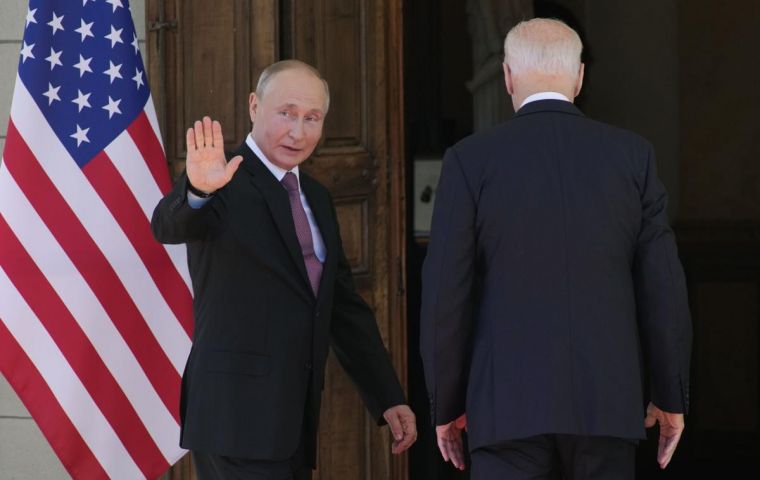MercoPress. South Atlantic News Agency
Ambassadors back to Moscow and Washington is main outcome of Biden-Putin Summit in Geneva
 Putin said he and Biden spoke “the same language”
Putin said he and Biden spoke “the same language” US and Russia's Presidents Vladimir Putin and Joseph Biden have agreed that the two countries’ ambassadors will return to their workplaces in Moscow and in Washington in what became the most significant announcement after Wednesday's summit in Geneva.
“As for the return of ambassadors to their places of work - of the US ambassador to Moscow, and, respectively, of the Russian to Washington, we agreed that this issue is resolved,” Putin told reporters after the meeting.
Both leaders have also agreed to hold talks on arms control as their deep disagreements on human rights, cyberattacks, election interference and Ukraine were also addressed.
The meeting on Wednesday was the first between the two leaders since Biden took office in January, and lasted for more than three hours.
Biden described the talks as “positive” while Putin said they were “constructive.”
The US President explained he outlined his country's interests, including cybersecurity, and made clear to Putin that Washington would respond if Russia infringed on those concerns. “I looked at him and said: ‘How would you feel if ransomware took on the pipelines from your oil fields?’ He said: ‘It would matter,'” Biden told reporters.
The query referred to a cyberattack that closed the Colonial Pipeline Co system for several days in May, preventing millions of barrels of gasoline, diesel and jet fuel from flowing to the US’s East Coast from the Gulf Coast. “I pointed out to him that we have the significant cyber capability. And he knows it,” Biden added.
The two sides reached an important agreement to return their chief diplomats to Moscow and Washington after they were brought home as the relationship deteriorated in recent months. Russia recalled its envoy after Biden said in March that he thought Putin was a “killer”. The United States recalled its ambassador soon after. Putin said on Wednesday that he had been satisfied by Biden’s explanation of the remark.
But there was no hiding their differences on issues such as human rights, where Biden said the consequences for Russia would be “devastating” if jailed Kremlin critic Alexei Navalny died.
Meanwhile, Putin dismissed US concerns about Navalny, Russia’s increased military presence near Ukraine’s eastern border and US suggestions that Russians were responsible for the cyberattacks on the United States. He also suggested Washington was in no position to lecture Moscow on rights, batting away question about his crackdown on political rivals by saying he was trying to avoid the “disorder” of a popular movement, such as Black Lives Matter.
“What we saw was disorder, disruption, violations of the law, etc. We feel sympathy for the United States of America, but we don’t want that to happen on our territory and we’ll do our utmost in order not to allow it to happen,” Putin said.
US-Russia relations have been deteriorating for years, notably with Russia’s 2014 annexation of Crimea from Ukraine, its 2015 intervention in Syria and US charges – denied by Moscow – of meddling in the 2016 election won by Biden’s predecessor, Donald Trump.
Putin, 68, said it was “hard to say” if relations would improve, but that there was a “glimpse of hope”. The Russian leader called Biden, 78, a constructive, experienced partner, and said they spoke “the same language”. But he added that there had been no friendship, rather a pragmatic dialogue about their two countries’ interests.
“The meeting was actually very efficient,” Putin said. “It was substantive, it was specific. It was aimed at achieving results, and one of them was pushing back the frontiers of trust.”
Putin said Moscow and Washington will begin discussions on possible changes to the New START arms control treaty after it expires in 2026, adding that the two countries are responsible for nuclear strategic stability. Signed in 2010, the New START treaty limits the numbers of strategic nuclear warheads, missiles and bombers that Russia and the United States can deploy.
Putin said Russia had provided exhaustive information to the US on cyberattacks and said the two sides agreed to start consultations on the matter. Neither side gave details on how their planned cybersecurity talks might unfold, although Biden said he told Putin that critical infrastructure should be “off-limits” to cyberattacks, saying that included 16 sectors including water and energy.
Regarding Ukraine’s potential NATO membership, the Russian leader said there was nothing of substance to discuss. He also accused Kyiv of breaching an agreement to halt a conflict between Ukrainian government forces and pro-Russian separatists in eastern Ukraine.




Top Comments
Disclaimer & comment rulesCommenting for this story is now closed.
If you have a Facebook account, become a fan and comment on our Facebook Page!